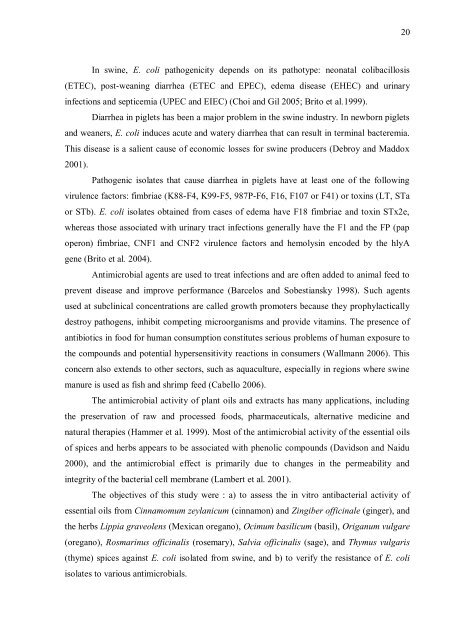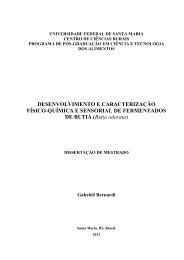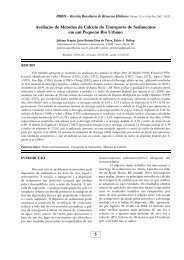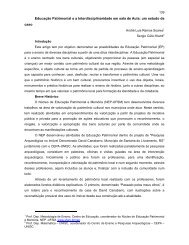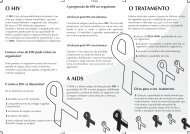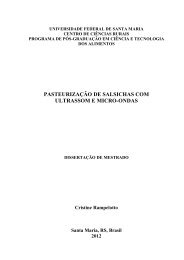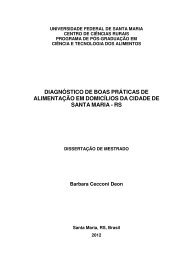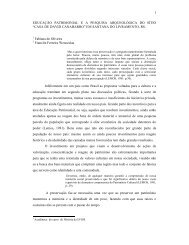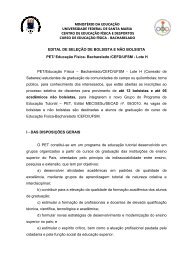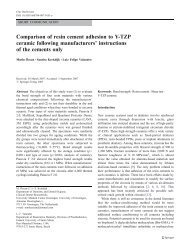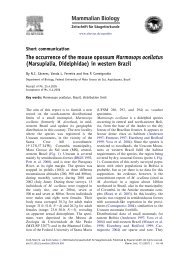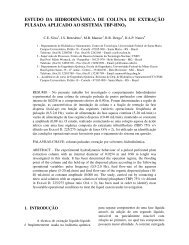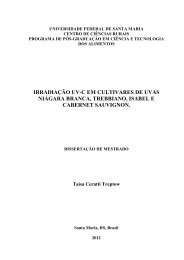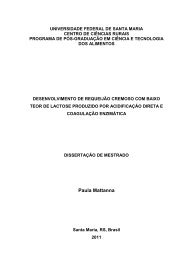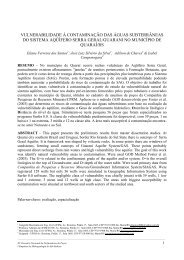ATIVIDADE ANTIMICROBIANA DE ÓLEOS ESSENCIAIS DE - UFSM
ATIVIDADE ANTIMICROBIANA DE ÓLEOS ESSENCIAIS DE - UFSM
ATIVIDADE ANTIMICROBIANA DE ÓLEOS ESSENCIAIS DE - UFSM
Create successful ePaper yourself
Turn your PDF publications into a flip-book with our unique Google optimized e-Paper software.
In swine, E. coli pathogenicity depends on its pathotype: neonatal colibacillosis<br />
(ETEC), post-weaning diarrhea (ETEC and EPEC), edema disease (EHEC) and urinary<br />
infections and septicemia (UPEC and EIEC) (Choi and Gil 2005; Brito et al.1999).<br />
Diarrhea in piglets has been a major problem in the swine industry. In newborn piglets<br />
and weaners, E. coli induces acute and watery diarrhea that can result in terminal bacteremia.<br />
This disease is a salient cause of economic losses for swine producers (Debroy and Maddox<br />
2001).<br />
Pathogenic isolates that cause diarrhea in piglets have at least one of the following<br />
virulence factors: fimbriae (K88-F4, K99-F5, 987P-F6, F16, F107 or F41) or toxins (LT, STa<br />
or STb). E. coli isolates obtained from cases of edema have F18 fimbriae and toxin STx2e,<br />
whereas those associated with urinary tract infections generally have the F1 and the FP (pap<br />
operon) fimbriae, CNF1 and CNF2 virulence factors and hemolysin encoded by the hlyA<br />
gene (Brito et al. 2004).<br />
Antimicrobial agents are used to treat infections and are often added to animal feed to<br />
prevent disease and improve performance (Barcelos and Sobestiansky 1998). Such agents<br />
used at subclinical concentrations are called growth promoters because they prophylactically<br />
destroy pathogens, inhibit competing microorganisms and provide vitamins. The presence of<br />
antibiotics in food for human consumption constitutes serious problems of human exposure to<br />
the compounds and potential hypersensitivity reactions in consumers (Wallmann 2006). This<br />
concern also extends to other sectors, such as aquaculture, especially in regions where swine<br />
manure is used as fish and shrimp feed (Cabello 2006).<br />
The antimicrobial activity of plant oils and extracts has many applications, including<br />
the preservation of raw and processed foods, pharmaceuticals, alternative medicine and<br />
natural therapies (Hammer et al. 1999). Most of the antimicrobial activity of the essential oils<br />
of spices and herbs appears to be associated with phenolic compounds (Davidson and Naidu<br />
2000), and the antimicrobial effect is primarily due to changes in the permeability and<br />
integrity of the bacterial cell membrane (Lambert et al. 2001).<br />
The objectives of this study were : a) to assess the in vitro antibacterial activity of<br />
essential oils from Cinnamomum zeylanicum (cinnamon) and Zingiber officinale (ginger), and<br />
the herbs Lippia graveolens (Mexican oregano), Ocimum basilicum (basil), Origanum vulgare<br />
(oregano), Rosmarinus officinalis (rosemary), Salvia officinalis (sage), and Thymus vulgaris<br />
(thyme) spices against E. coli isolated from swine, and b) to verify the resistance of E. coli<br />
isolates to various antimicrobials.<br />
20


